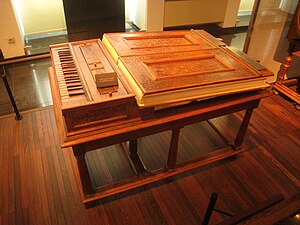
In the historically informed performance movement, musicians perform classical music using restored or replicated versions of the instruments for which it was originally written. Often performances by such musicians are said to be "on authentic instruments".
This article consists of a list of such instruments in the European tradition, including both instruments that are now obsolete and early versions of instruments that continued to be used in later classical music.
Renaissance (1400–1600)

Strings
- Violin
- Viol
- Viola
- Cello
- Lira da braccio
- Contrabass
- Violone
- Lute
- Theorbo
- Archlute
- Gittern
- Mandore
- Harp
- Cittern
- Vihuela
Woodwinds
Brasses
Keyboards
Percussion
Baroque (1600–1750)

Strings
- Violino piccolo
- Violin
- Viol
- Viola da gamba
- Viola
- Viola d'amore
- Viola pomposa
- Tenor violin
- Cello
- Violoncello piccolo
- Contrabass
- Colascione
- Violone
- Lute
- Theorbo
- Archlute
- Angélique
- Mandore
- Mandolin
- Baroque guitar
- Harp
- Hurdy-gurdy

Woodwind
- Baroque flute
- Chalumeau
- Kortholt (also known as Cortholt, Curtall, Oboe family)
- Dulcian
- Baroque oboe
- Rackett
- Recorder
- Oboe d'amore
- Oboe da caccia
- Contrabassoon
- Taille
- Cor anglais
Brasses
Keyboards
Percussion
Classical (1750–1820)

Strings
Woodwinds
- Basset clarinet
- Basset horn
- Clarinette d'amour
- Clarinet
- Chalumeau
- Flute
- Oboe
- Bassoon
- Contrabassoon
- Cor anglais
Keyboards
Brasses
- Buccin
- Ophicleide—a Serpent replacement, precursor of the Tuba
- Natural trumpet
- Natural horn
- Trombone
- Post horn
Percussion
See also
External links
- Early musical instruments
- Historical Brass Instruments as described by Antique Sound Workshop, Ltd.
| Historically informed performance | |
|---|---|
| Early music festivals | |
| Instrument builders | |
| Instrument collections | |
| Instrument collectors | |
| Primary instruments | |
| Instruction | |
| Societies | |
| Labels | |
| Shows | |
| Other | |